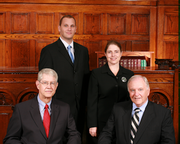What Are the Differences Between Wills & Trusts?

As you begin the estate planning process, the first terms you’ll face are “will” and “trust.” That’s because these elements will account for the majority of the assets within your estate. However, you may not know how they differ or wonder which option is best. If so, below is more information that details the advantages and disadvantages of both tools.
Wills
A will is the most common estate planning document. All you have to do is draft the document with your attorney. In a will, you can list out the various elements of your estate and who you would like to leave them to, such as your baseball card collection and jewelry.
You can also use a will to choose a new owner for your pet, as well as a guardian for your children if they are still minors when you pass away. Your will can even include your wishes for the funeral, such as a preference for burial or cremation, or the burial site.
Wills go through the probate process, which means that a judge must authenticate the document before the distribution of your assets to the beneficiaries. This can take weeks or months, depending on the size and complexity of the estate. Still, you should establish a will if you have minor children so that the court doesn’t choose a guardian for you.
Wills are also the only way to account for assets you may forget about or be unaware of. For example, you can include a clause that donates all of your unmentioned belongings to a local charity.
Trusts
 When you establish a trust, you put assets inside of it, as if it were a legal container. Then, you can assign an individual that will become the owner of the trust once you pass away.
When you establish a trust, you put assets inside of it, as if it were a legal container. Then, you can assign an individual that will become the owner of the trust once you pass away.
Many people use trusts for expensive assets like homes, cars, and valuable jewelry. This is because you can also choose when the individual has access to their trust. For example, if you want to leave a savings account to your child, you could ensure that they don’t get the funds until they graduate college.
Trusts are a popular choice because they don’t need to go through probate. This way, your assets will immediately transfer to the chosen individuals, without a lengthy waiting period. Trusts are also private, while wills go on public record.
In many cases, estate planning professionals recommend that clients set up both a will and a trust. You can take care of both with the help of The Law Offices of Bromm, Lindahl, Freeman-Caddy & Lausterer. This Wahoo, NE, firm provides a wide range of estate planning services to clients, from establishing guardianship to working around probate. They’ve been helping area residents since 1893, and have the AV Preeminent™ rating from Martindale-Hubbell®. To learn more about their services, visit them online. Call (402) 443-3225 to schedule a consultation.
About the Business
(5 reviews)
Have a question? Ask the experts!
Send your question

